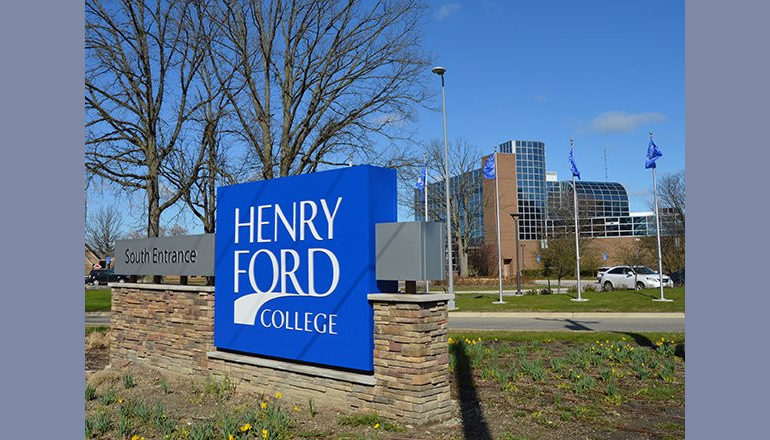DEARBORN — Henry Ford College (HFC) is the first college in the United States to offer a Battery Technician Certification curriculum. The program is set to launch in the Fall 2023 semester.
This program will enhance courses and programs that are already recognized by the Electric Vehicles (EV) Jobs Academy. The curriculum will align with the employer-defined workforce competencies needed for success in this field.
An agreement was recently signed by HFC and the Michigan Community College Association (MCCA) Educational Programs in Collaboration (EPiC) with assistance from Governor Whitmer, the Southeast Michigan Community Alliance Workforce Intelligence Network (WIN) and the Michigan Department of Labor and Economic Opportunity (LEO) to launch Battery Technician Certification training in the state.
“The EV Jobs Academy is focused on connecting Michiganders with good-paying advanced manufacturing jobs building electric vehicles, batteries and other automotive components,” Whitmer said. “The new battery job training program at Henry Ford College will offer Michiganders seeking an in-demand, high-skill career the training and education they need to succeed. By forging effective partnerships, we are shoring up our leadership in mobility and electrification, helping employers fill their workforce needs and delivering on the goals of ‘Make It in Michigan’, our comprehensive vision for economic development that focuses on winning projects, investing in people and revitalizing places. Let’s keep connecting hardworking Michiganders with the education they need to land one of the thousands of good-paying jobs we are competing to bring home.”
The Battery Technology Certification curriculum will help approximately 3,000 Michiganders complete a short-term training certification from community colleges statewide through 2027. HFC leads the way as the first college to participate. The training will help employers participating in the EV Jobs Academy prepare current and future employees with the wide range of skills they need to succeed in electric vehicle and mobility-related occupations, where they will earn an average wage of $30 an hour.

The EV Jobs Academy, an employer-led collaborative, convenes community colleges, universities and private training providers to design and develop solutions for critical training needs in EVs and mobility within Michigan. A Battery Technician Certification curriculum is an all-inclusive start, which has been widely delivered in Europe.
In addition to the EV Jobs Academy grant awarded in 2022, the Workforce Intelligence Network was awarded a $10 million U.S. Department of Labor H-1B One Workforce grant for a project called “Building an Industry Infinity Supply Chain” (Industry Infinity). This project supports curriculum development and training for occupations in transportation, cybersecurity and advanced manufacturing. Due to the overlap of eligible occupations within both grants, HFC was able to acquire the Battery Technology Certification curriculum through Industry Infinity funds.
“Henry Ford College has a history of innovation in workforce development, and this new curriculum will prepare our graduates for the careers of the future in transportation and other fields,” said HFC President Russell Kavalhuna in a press release. “This is also a great example of partnerships between public and private organizations and the state working together to establish Michigan as a leader in electrical technology. The EV Jobs Academy and Industry Infinity are forward-looking initiatives and we are proud to be among the first to invest in this world-class program for our students.”
EPiC’s procurement of the EIT InnoEnergy Battery Technician curriculum brings certification training statewide to all EPiC Consortium partners. This is the first EIT InnoEnergy partnership in the U.S. This program will put HFC in a unique position to offer skills training and Battery Technician Certification across Michigan. HFC is the first of four host colleges in Michigan selected by the MCCA and LEO to host a battery lab.
“The fact that we are the first college in the nation to offer this curriculum demonstrates that HFC is taking the lead in offering cutting-edge programs. This is truly Future-Driven!” said HFC Vice President of Academic Affairs Dr. Michael Nealon.
“Evolving industries that will drive sustainable progress, such as e-mobility, are facing a significant deficit of skills if they are to scale at their current pace,” said Oana Penu, director of the InnoEnergy Skills Institute. “The transition to net zero will require retraining up to 18 million workers around the world. This global challenge requires a global response and we are able to provide exactly that with InnoEnergy’s Skills Institute. It is designed to combat this growing skills gap and we are delighted to be supporting the roll-out of the EV battery curriculum.”
The Battery Technology Certification curriculum will also enhance existing programs and current careers in automotive, maintenance and repair technicians, electrical and electronics technicians, mechatronics and cybersecurity, serving to upskill incumbent workers with foundational knowledge and skillsets in battery technology.
“Thanks to Henry Ford College, we are able to scale the Battery Technology curriculum through the EPiC platform, which includes 16 Community Colleges in the state of Michigan,” said Dr. Amy Lee, executive dean of MCCA’s EPiC Consortium. “The Henry Ford College purchase allows other colleges access to the cutting-edge curriculum.”
Students wishing to enroll in the Battery Technology curriculum in automotive, manufacturing or cybersecurity this fall should visit www.hfcc.edu/battery-tech.






Leave a Reply